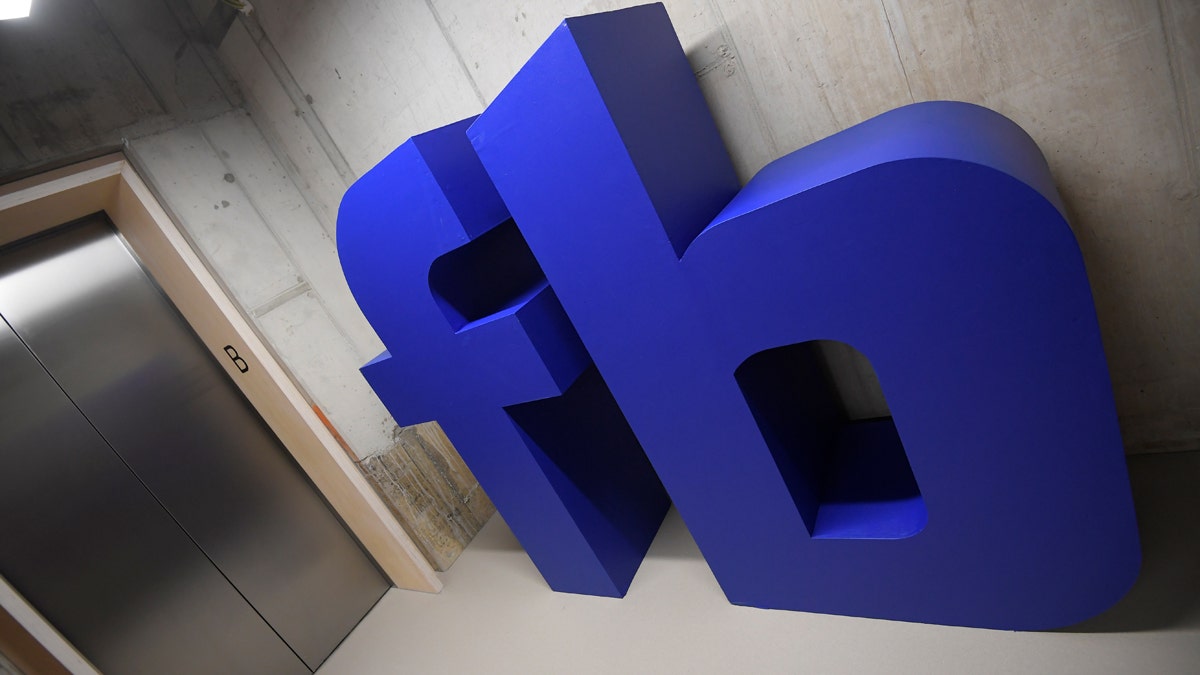
File photo: A giant logo is seen at Facebook's headquarters in London, Britain, December 4, 2017. (REUTERS/Toby Melville)
Facebook is getting slammed by child-health advocates who have written a letter urging the company to discontinue its recently released Messenger Kids app, saying it will "undermine children’s healthy development."
Over 100 advocates, including Campaign for a Commercial-Free Childhood, ACLU of Massachusetts and Centre for Child Honouring have signed the letter, addressed to Facebook CEO Mark Zuckberg. They note that children under the age of 13 are not ready to have social media accounts, despite the precautions Facebook has taken with the app.
"At a time when there is mounting concern about how social media use affects adolescents’ wellbeing, it is particularly irresponsible to encourage children as young as preschoolers to start using a Facebook product," the letter reads.
FACEBOOK, COCAINE, OPIOIDS: HOW ADDICTIVE IS THE SOCIAL NETWORK?
Currently, the app is only available on iOS, but Facebook has said the app would be coming to the Amazon App Store and Google Play "in the coming months."
The authors also noted that young children "are not old enough to navigate the complexities of online relationships, which often lead to misunderstandings and conflicts even among more mature users."
In a statement to Fox News, a Facebook Messenger spokesperson said: “Since we launched in December we’ve heard from parents around the country that Messenger Kids has helped them stay in touch with their children and has enabled their children to video chat with fun masks with family members near and far. For example, we’ve heard stories of parents working night shifts being able read bedtime stories to their children, and moms who travel for work getting daily updates from their kids while they're away."
The spokesperson continued: "We worked to create Messenger Kids with an advisory committee of parenting and developmental experts, as well as with families themselves and in partnership with National PTA. We continue to be focused on making Messenger Kids be the best experience it can be for families. We have been very clear that there is no advertising in Messenger Kids.”
The app, free from advertising and controlled via a parent's Facebook account, was launched in December. It was developed utilizing parent input and more than a dozen "expert advisors in the areas of child development, online safety, and children's media and technology," according to Facebook Product Management Director Loren Cheng, who penned a blog post announcing the new app.
It's also compliant with the Children's Online Privacy and Protection Act, which "imposes certain requirements on operators of websites or online services directed to children under 13 years of age, and on operators of other websites or online services that have actual knowledge that they are collecting personal information online from a child under 13 years of age."
In addition to there being no advertising, Facebook's Cheng wrote that the information collected would not be used for advertising purposes.
"After talking to thousands of parents, associations like National PTA, and parenting experts in the US, we found that there's a need for a messaging app that lets kids connect with people they love but also has the level of control parents want," Cheng wrote in the post.
The child-health advocates' open letter, dated Jan. 30, said Messenger Kids is "likely to increase the amount of time pre-school and elementary age kids spend with digital devices." The authors cited studies from Common Sense Media and the American Pyschological Association that said 78 percent of adolescents check their phones hourly and 50 percent say they feel addicted to their phones.
A source familiar with the situation noted that Facebook believes there needs to be in-person interaction, adding the company is "not looking to replace in-person play time or time spent outdoors with apps."
The source added Facebook has also made a $1 million investment into research in to the interaction between technology and children and that the recommendations of the letter are not aligned with the recommendations of the American Academy of Pediatrics, who have recently recommended limiting but not eliminating screen time.
FACEBOOK ROLLING OUT AD-FREE MESSENGER FOR KIDS IOS APP
More scrutiny than ever
The letter comes at a time when there is intense scrutiny, from investors, health advocacy experts and former Facebook employees about the effect social media and Facebook as its largest player are having on the health of society.
Last week, billionaire investor George Soros slammed the company and its advertising counterpart Google, calling them a "menace" and "obstacles to innovation."
In November, Chamath Palihapitiya, a former Facebook executive, said social media is damaging society and voiced concerns about its impact on his own children.
"The short-term, dopamine-driven feedback loops that we have created are destroying how society works," Palihapitiya said. "No civil discourse. No cooperation. Misinformation. Mistruth. And it's not an American problem. This is not about Russian ads. This is a global problem. So we are in a really bad state of affairs right now, in my opinion. It is eroding the core foundations of how people behave by and between each other."
Facebook later fired back at Palihapitiya, who subsequently backtracked his comments. He said "Facebook is a force for good in the world," while adding that his comments were meant to be used as a conversation starter on how to use social media responsibly.
Also in November, former Facebook president Sean Parker questioned "what it's doing to our children's brains."
Follow Chris Ciaccia on Twitter @Chris_Ciaccia. This story has been updated to include Facebook's response.




















